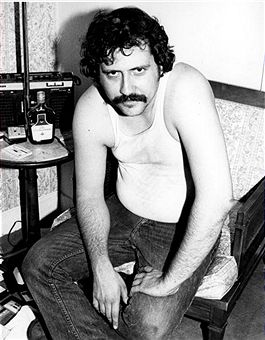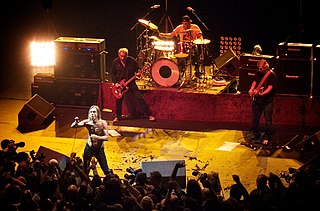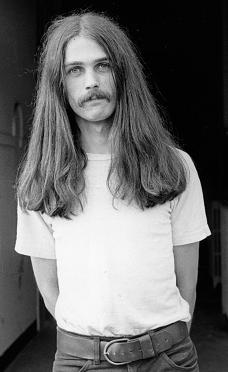
Leslie Conway "Lester" Bangs was an American music journalist and critic. He wrote for Creem and Rolling Stone magazines and was also a performing musician. The music critic Jim DeRogatis called him "America's greatest rock critic".
Punk rock is a music genre that emerged in the mid-1970s. Rooted in 1950s rock and roll and 1960s garage rock, punk bands rejected the corporate nature of mainstream 1970s rock music. They typically produced short, fast-paced songs with hard-edged melodies and singing styles with stripped-down instrumentation. Lyricism in punk typically revolves around anti-establishment and anti-authoritarian themes. Punk embraces a DIY ethic; many bands self-produce recordings and distribute them through independent labels.

The punk subculture includes a diverse and widely known array of music, ideologies, fashion, and other forms of expression, visual art, dance, literature, and film. Largely characterised by anti-establishment views, the promotion of individual freedom, and the DIY ethics, the culture originated from punk rock.

The Stooges, originally billed as the Psychedelic Stooges, and also known as Iggy and the Stooges, were an American rock band formed in Ann Arbor, Michigan, in 1967 by singer Iggy Pop, guitarist Ron Asheton, drummer Scott Asheton, and bassist Dave Alexander. Initially playing a raw, primitive style of rock and roll, the band sold few records in their original incarnation and gained a reputation for their confrontational performances, which often involved acts of self-mutilation by Iggy Pop.

MC5 was an American rock band formed in Lincoln Park, Michigan, in 1963. The classic lineup consisted of vocalist Rob Tyner, guitarists Wayne Kramer and Fred "Sonic" Smith, bassist Michael Davis, and drummer Dennis Thompson. MC5 were listed by Parade as one of the best rock bands of all time and by VH1 as one of the greatest hard rock artists of all time. The band's first three albums are regarded by many as staples of rock music, and their 1969 song "Kick Out the Jams" is widely covered.
The music of Michigan is composed of many different genres. The city of Detroit has been one of the most musically influential and innovative cities for the past 50 years, whether in Michigan or anywhere else in the United States. Impressively, for 48 straight years (1959–2007) a greater Michigan-area artist has produced a chart-topping recording. Michigan is perhaps best known for three developments: early punk rock, Motown, and techno.
Proto-punk is rock music from the 1960s to mid-1970s that foreshadowed the punk rock movement. A retrospective label, the musicians involved were generally not originally associated with each other and came from a variety of backgrounds and styles; together, they anticipated many of punk's musical and thematic attributes. The tendency towards aggressive, simplistic rock songs is a trend critics such as Lester Bangs have traced to as far back as Ritchie Valens' 1958 version of the Mexican folk song "La Bamba", which set in motion a wave of influential garage rock bands including the Kingsmen, the Kinks, the 13th Floor Elevators and the Sonics. By the late 1960s, Detroit bands the Stooges and MC5 had used the influence of these groups to form a distinct prototypical punk sound. In the following years, this sound spread both domestically and internationally, leading to the formation of the New York Dolls and Electric Eels in the United States, Dr. Feelgood in England, and the Saints in Australia.

Creem is an American rock music magazine and entertainment company, founded in Detroit, whose initial print run lasted from 1969 to 1989. It was first published in March 1969 by Barry Kramer and founding editor Tony Reay. Influential critic Lester Bangs served as the magazine's editor from 1971 to 1976. It suspended production in 1989 but attained a short-lived renaissance in the early 1990s as a tabloid. In June 2022, Creem was relaunched as a digital archive, website, weekly newsletter, and quarterly print edition.
Deniz Tek is an American singer, guitarist and songwriter and a founding member of Australian rock group Radio Birdman. He has played in many of the underground rock bands of the 1970s, including Australian bands The Visitors and New Race, but is most known for exerting his burning Detroit-style guitar influence over the punk rock genre in Australia.

The history of the punk subculture involves the history of punk rock, the history of various punk ideologies, punk fashion, punk visual art, punk literature, dance, and punk film. Since emerging in the United States, the United Kingdom and Australia in the mid-1970s, the punk subculture has spread around the globe and evolved into a number of different forms. The history of punk plays an important part in the history of subcultures in the 20th century.

Gary Grimshaw was an American graphic artist active in Detroit and San Francisco who specialized in designing rock concert posters. He was also a radical political activist with the White Panther Party and related organizations.

"Kick Out the Jams" is a song by MC5, released as a single in March 1969 by Elektra Records. The album of the same name caused some controversy due to inflammatory liner notes by the band's manager, John Sinclair, and the track's rallying cry of "Kick out the jams, motherfuckers!". According to guitarist Wayne Kramer, the band recorded this as "Kick out the jams, brothers and sisters!" for the single released for radio play; lead vocalist Rob Tyner claimed this was done without group consensus. The edited version also appeared in some LP copies, which also withdrew Sinclair's excitable comments. The album was released in January 1969; reviews were mixed, but the album was relatively successful, quickly selling over 100,000 copies and peaking at #30 on the Billboard album chart in May 1969 during a 23-week stay.

Danny Fields is an American music manager, publicist, journalist, and author. As a music industry executive from the 1960s to the 1980s, he was one of the most influential figures in the history of punk rock. He signed and managed Iggy and the Stooges, signed the MC5 and managed the Ramones, and worked in various roles with Jim Morrison, the Velvet Underground and the Modern Lovers. In 2014 The New York Times said, "You could make a convincing case that without Danny Fields, punk rock would not have happened."
Australian musicians played and recorded some of the earliest punk rock, led by The Saints who released their first single in 1976. Subgenres of punk music, such as local hardcore acts, still have a strong cult following throughout Australia.
Garage punk is a rock music fusion genre combining the influences of garage rock, punk rock, and often other genres, that took shape in the indie rock underground between the late 1980s and early 1990s. Bands drew heavily from 1960s garage rock, stripped-down 1970s punk rock, and Detroit proto-punk, and often incorporated numerous other styles into their approach, such as power pop, 1960s girl groups, hardcore punk, blues, early R&B and surf rock.
Punk rock and hardcore punk in Brazil originated in the late 1970s, influenced by bands such as Sex Pistols, The Clash, Stiff Little Fingers, and The Ramones. The first known Brazilian punk rock band was Restos de Nada, which appeared in mid-1978 and set the stage for the emergence of many other bands that formed the Brazilian punk scene.

Dennis Thompson was an American drummer known for playing with the 1960s–70s Detroit proto-punk/hard rock group MC5, which had a No. 82 US single with "Kick Out the Jams" and a No. 30 US album with the same name.

Detroit Rock City: The Uncensored History of Rock 'n' Roll in America's Loudest City is a book by Steve Miller, a Michigan-based journalist. It chronicles Detroit bands from 1967 to the 2000s. The book's narrative is told through verbatim quotes. It was released on June 25, 2013, by Da Capo Press.

Vinyl is an American period drama television series created by Mick Jagger, Martin Scorsese, Rich Cohen and Terence Winter. The series stars Bobby Cannavale as Richie Finestra, a New York City-based record executive in 1973. It premiered on HBO on February 14, 2016, and concluded on April 17, 2016.

Detroit Stories is the twenty-first solo and twenty-eighth overall studio album by American rock musician Alice Cooper. The album was released on February 26, 2021, by Earmusic. It crowned Billboard's Top Album Sales chart debuting at No. 1 and was the first chart-topper for Cooper in the 29-year history of the Top Album Sales chart. The album was produced by Bob Ezrin, who also added various instruments. As a solo album, it incorporates a variety of artists contributing on a number of instruments.













